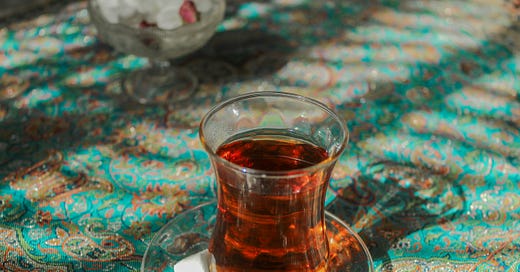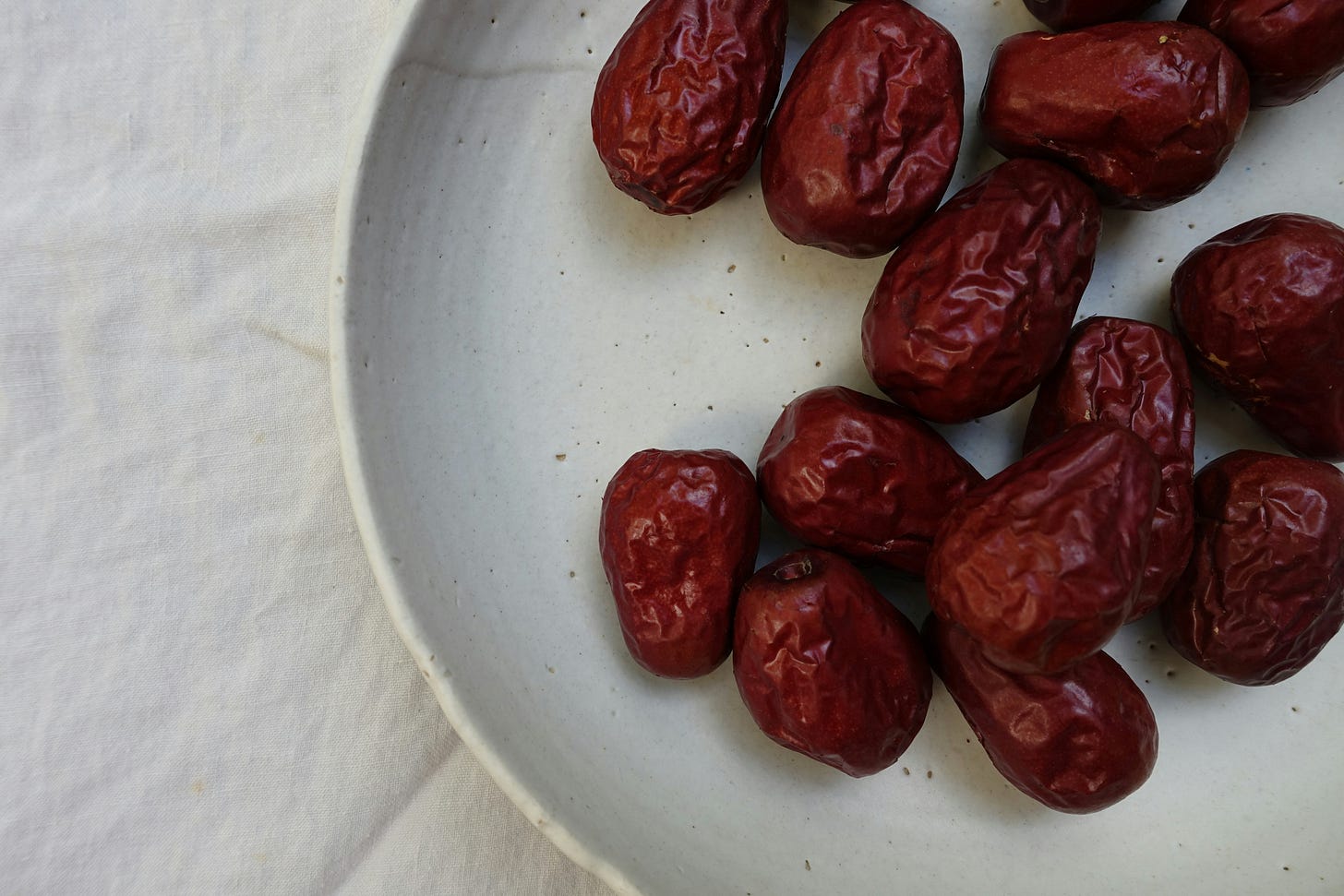A Glass of Tea and Community
My first iftar, the meal that breaks the daily fast during Ramadan, did not disappoint
Photo by Abolfazl Ranjbar on Unsplash
LAST NIGHT MY HUSBAND AND I knocked on a stranger’s door and were invited in for iftar, the evening meal that breaks each day’s fast for Muslims during Ramadan. We’d been matched through a program at our synagogue that paired Jewish families with Muslim families who were gracious enough to invite strangers to iftar at their home.
We were the only non-Muslims at the table, and I was the only Jew. Our hosts and another guest were Turkish. A family from Libya—father, mother, and teenage son—completed the group.
The table was covered with bowls of food served family style: meat and cabbage, sweet carrots in yogurt, stuffed peppers, green beans, salad. We began with dates—both fresh and dried—and then a bowl of red lentil soup, its top swirled with paprika, served with slabs of homemade white bread.
Every place was set with a delicate, hourglass-shaped glass for tea, which our hosts kept filled from a Turkish double tea pot, one pot holding steeping tea leaves, the other hot water—an ingenious arrangement that lets you adjust the strength of the tea for each person.
We were a table full of strangers, and at first we talked about the weather, the food, what people did for work: a doctor, a retired dentist, a physics professor, a journalism professor, a photographer, a medical postdoc. But slowly we ate and talked and laughed, and slowly the conversation became more personal.
We heard about life in Libya, where 95 percent of the land is desert, and about Turkey, a homeland now rendered inaccessible to the Turks at the table because of politics. At some point everyone but my husband and me got up for Maghrib, one of the five daily prayers Muslims recite: women in one room, men in another, each with his or her own prayer rug. I was struck by the similarity of the Arabic word Maghrib with the Hebrew word Ma’ariv, the evening prayer in Judaism, one of the three daily services Jews recite.
When we reconvened, the talk turned to religion. That was, after all, why we were gathered. Our host leaned across the table and asked me whether Jews believe in an afterlife. I laughed nervously and explained that while there’s nothing about an afterlife in the Torah, observant Jews believe that when the Messiah comes they will be resurrected. “Ask five Jews what they believe about life after death and you’ll get five different answers,” I said. “Maybe six.” But everything I know suggests that for Jews, this world is the important one.
That led to a discussion about tikkun olam, Hebrew for “repairing the world,” a phrase that signifies social justice efforts. Our host explained that Islam, too, centers fairness and social justice.
AND AS WE SAT AROUND THE TABLE, drinking tea and talking for hours, strangers who would never have met if not for our hosts’ openness and hospitality, I imagined some torn thread on the loom of the world knitting itself back together. So much about this moment in history feels broken, with a war raging between Jews and Muslims in Israel, with the global rise in both Islamophobia and anti-Semitism in the U.S. and around the world.
The eight of us sitting around that table couldn’t change those facts. But the sharing of food, of conversation, and most of all respect—for one another, for our different cultures—felt monumental. It felt like a win against the forces of darkness that drive people toward hatred and violence.
We left with ideas for getting together again, maybe for coffee night at the local Turkish Cultural Center. I hope to visit a mosque with one of our dinner companions, and have invited him to visit our synagogue. I’m greedy for more meals, more conversations, more community. More of whatever repairs this damaged world.






Stellar post. You make the possibility of repair believable.
You write, “So much about this moment in history feels broken, with a war raging between Jews and Muslims in Israel”. No - it’s not a war between Jews and Muslims - Jews and Muslims got along fine in Palestine before the arrival of the soul dead Zionists in the region. Zionist Israel is an out of control genocidal minded colonial power supplied with endless weaponry that has and continues to decimate the people from whom they stole land. Your views as evidenced in your comments here are very different from what’s suggested by your article and by the kindness shown to you at the iftar. At least tell me you’re OK with a one state solution with full equality of rights for all in the current borders, and a right of return. Then things could be as they were before the voracious inhumanity of political Zionism began its spree of theft, slaughter, and ethnic cleansing.